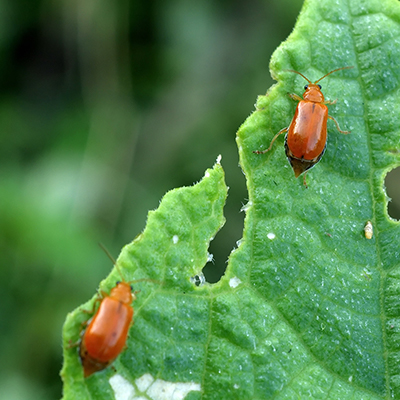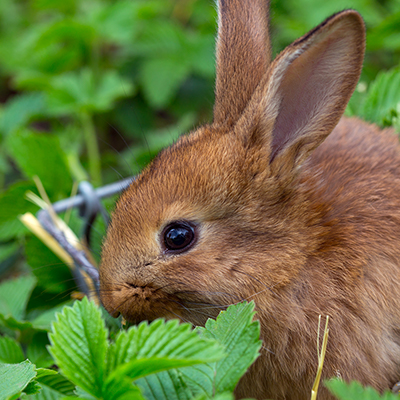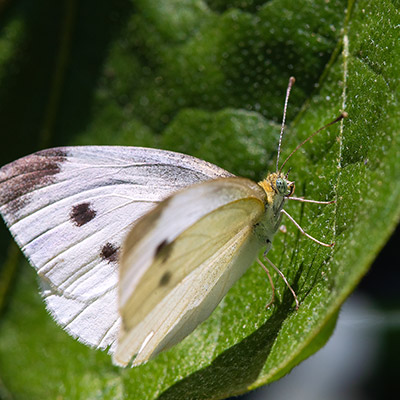Natural Pest Control for Your Outdoor Spaces

Last updated July 25, 2024
Whether your problem pest is deer in your garden or mosquitoes on your patio, there are natural and organic solutions to manage your problems.
Finding natural, organic and eco-conscious solutions for pest problems is an essential part of everyday home maintenance. In this guide, learn more about natural pest control products designed to treat outdoor pests. These green pest solutions will keep your backyard safe and control pests.
Table of Contents
Benefits of Organic Pest Control
Natural Pest Control Methods
Creating a Pest-Free Garden
Preventing Pest Problems
Organic Pest Control Products
Tips for Effective Organic Pest Control
Benefits of Organic Pest Control

Homeowners look for natural and organic solutions for outdoor pest problems for many reasons. Your goal may be organic pest control for lawns, or to provide a safer environment for children and pets, or you may just want to reduce the amount of toxic chemicals you use around your home. Toxic chemicals can be difficult to use and to store, and the runoff from excess use can be harmful downstream.
The pests can be insects like pesky mosquitoes and ants, or destructive mammals like deer and rabbits. The best, most effective method to treating pests is to use the IPM (Integrated Pest Management) technique. Following IPM principles helps you to identify and treat problems in your garden and landscape and find the least toxic solution.
Steps to Integrated Pest Management (IPM):
- Begin by setting a level at which to take action. Isolated sightings of pests do not always mean action is needed. For most home gardeners, the damage to plants is usually between annoying and critical.
- Monitor and identify pests to make sure the insect or critter is the real problem. This ensures that you're using the correct pesticide or trap when it's needed.
- Prevention is the first line of pest control. When you're planting a garden, build barriers to keep deer and rabbits out, or choose pest resistant varieties of plants. Cultural methods like crop rotation can prevent pest problems, too.
- When pests are correctly identified and preventive methods no longer work, then a proper control is selected. At this stage, lower risk products and methods are employed first.
Natural Pest Control Methods

Common methods of natural pest control include beneficial insects and companion planting. Both methods start with what you plant in your garden.
Beneficial insects are the good bugs that take out bad bugs in your garden. There are more than a million identified insect species and fewer than 2 percent are harmful. You can attract beneficial insects to your garden to help manage pests. For example, lady bugs help bring down aphid populations. Use ladybug lures to attract lady bugs (also called lady beetles) to your garden to feast on aphids.
More beneficial insects:
- Dragonflies eat mosquitoes and aphids.
- Lacewings prey on aphids and caterpillars.
- Nematodes live in the soil and eat grubs and beetle larvae.
One of the easiest ways to manage pests in your garden is with plants. Let herbs like cilantro, dill and fennel flower and go to seed. Their umbrel-type flowers provide nectar for beneficial wasps.
Use companion planting techniques to manage pests. Vegetable gardeners will often plant marigolds with tomatoes, hoping the flowers' fragrance will repel nematodes in the soil. You can also use plants as trap crops that are so attractive, they pull insects away from the primary crop.
In many cases, physical barriers can help protect plants without using chemicals. Consider these products:
- Row covers shield flowers and vegetables from pests while allowing light and moisture through.
- Copper tape can be placed around garden beds to deter slugs and snails.
- Sticky traps capture flying insects like whiteflies and gnats.
Creating a Pest-Free Garden

While you may think a pest-free garden is desirable, in practice, every garden will have pest and disease pressure, and gardening is about managing these problems.
Continually building up healthy soil will help your garden bounce back from insect damage. Follow organic best practices and amend your soil with organic compost. Vermicompost (worm castings) are a beneficial additive to vegetable gardens. In fact, vermicompost helps your plants resist insect damage. You can add a small amount of vermicompost mixed into the soil when planting, or top dress plants already in the ground.
Plants that are not properly watered can be vulnerable to pests. Keep newly planted shrubs, perennials and trees watered until they establish sufficient root systems. A blanket of mulch helps plants retain moisture and keeps roots cool, especially in times of extreme heat.
Preventing Pest Problems

Set up a scouting routine in your garden, where you walk through, turn over leaves and examine your plants. Scouting is often the best way to catch pests before they become problems.
You can construct barriers throughout your garden. Fences can keep out deer, raised garden beds may be difficult for rabbits to access. Row covers can keep insects away from your vegetables.
Organic Pest Control Products

The most common natural pest control products include pest repellents and pest traps.
Ready-to-use natural pest control products include:
- All-purpose insecticides made from natural plant oils and essential oils.These natural remedies control beetles, ants, roaches and other insects. Many are labelled safe for use around children and pets.
- Diatomaceous earth (DE) is a natural insecticide made from the crushed fossilized remains of marine phytoplankton. The sharp edges of the white powder abrade insect bodies and dry them out. DE is ideal for killing ants and other outdoor insects.
- Neem oil is a natural insecticide made from the extract of the neem tree. It’s used to control a spectrum of insect pests including aphids, mites and whiteflies. Mix neem oil with water and apply as a foliar spray to plant leaves and stems.
- Bt is a natural bacterial insecticide derived from Bacillus thuringiensis.It’s used for treating caterpillars, worms, and other leaf-eating pests. Spray directly onto foliage where pests are present. Bt does not distinguish between good and bad caterpillars. When you spray foliage with Bt, keep in mind that you may be harming beneficial caterpillars, too.
- Insecticidal soap used to control pests on fruit trees.
In addition to repellents, there’s a variety of natural pest traps that help control insect populations. Look for:
- Carpenter bee traps
- Japanese beetle traps
- Fly traps and bug zappers that will help manage pest populations.
If deer are dining on your garden plants, look to deer repellent sprays to protect your landscape. These strongly scented products contain natural ingredients like garlic, peppermint oil and putrescent egg solids to deter deer.
In addition to repellent sprays, consider motion-activated sprinklers for deer control. When deer activate the trigger, the device releases a burst of water to startle the deer.
Tips for Effective Organic Pest Control

Organic pest control, from insects to wildlife, often requires an ongoing and multi-layered strategy. In addition to the products shown here, you can control pests through methods like row covers and fences, improving your soil to build up healthy plants that will bounce back after damage, companion planting, trap cropping, crop rotation and planting for beneficial insects. Overall, choosing organic gardening products and methods will help you grow a more resilient garden.
Many gardeners look to make homemade sprays with ingredients from around their homes like garlic and dish soap. Experts recommend against concocting homemade pesticides for many reasons. These products can be harmful to pets and humans, and they can harm your plants. For example, dish soap contains a powerful detergent that can strip the waxy coating from the foliage of your plants. Commercially available pest control products are tested to be highly effective against targeted pests and when used correctly, will not harm plants.
Always use pest control products, including natural and organic products, according to label directions and be sure to store them out of reach of children and pets.
Looking for green pest solutions and supplies you need to control outdoor pests in your garden? The Home Depot delivers online orders when and where you need them.






























